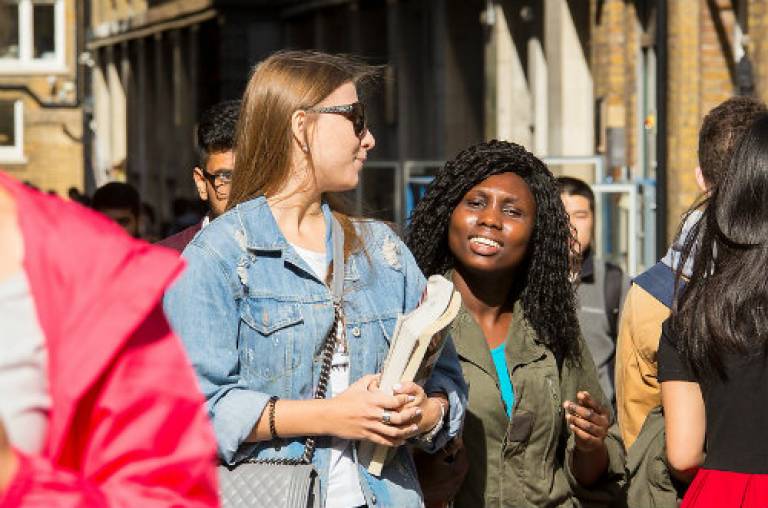Meet the researcher programme in the Division of Psychology and Language Sciences
New Linguistics undergraduates meet Linguistics researchers in their first week at UCL.

15 January 2016
The Meet the Researcher programme is designed to help the new students meet each other and to introduce them to the breadth of research in Linguistics at UCL right at the start of their degree programme. Stefanie Anyadi describes how it works.
New students briefed and supported by transition mentors
Researchers in the Division of Psychology and Language Sciences are recruited by the teaching administrator in early September and receive guidelines on the process and what is expected of them.
Researchers and transition mentors are informed of the allocations before the start of term, and new students are informed at the welcome meeting early in registration week.
The expected intake for new students is approximately 50; as such they are divided into groups of five, and two groups are allocated to one transition mentor. We attempt to make the groups as diverse as possible.
We also provide guidelines for transition mentors and liaise closely with the Senior Transition Mentor to ensure they are all well briefed.
The process
The new students are expected to give a presentation as part of the programme in order to feedback what they have found out about their researcher and their research. As well as building understanding of the linguistics discipline, students benefit from early exposure to delivering presentations and public speaking.
- At the first meeting, mentors explain the process, support the new students with their groupwork and discuss possible questions to be asked of the researcher.
- On the day set aside in registration week for the Meet the Researcher meetings, the groups see their researcher for a 30-minute interview.
- At the next transition mentor meeting, students are supported in their presentation skills and the groups are asked to upload their draft presentation to Moodle.
- Researchers give feedback within a few days.
In mid-October, we organise a meeting for the whole cohort, over pizza, where the groups deliver their short presentations about their researcher to the whole cohort in a very informal atmosphere.
Benefits of the scheme for new students
- Early involvement of students with a range of linguistics staff increasing motivation and inspiration
- A better understanding of academic content and an early overview of the field
- Students start to collaborate early on and acquire transferable skills
- Students start to build a support network early on and meet others from a range of backgrounds
- Early student engagement with Moodle
The programme has been well-received by participating researchers who acknowledge that the experience has tanglible long-term benefits for students.
With 79% of students in our most recent poll expressing that the programme was beneficial, the comments fed back to us have been positive.
One student wrote: "I think working in a group immediately put me into contact with some people I might not have approached on my own. This was helpful in adjusting, as there were people I knew from the very first days. Speaking in front of the entire class was also a good experience, especially for someone like me who does not like presenting and is quite shy."
Another commented: "Being able to meet and talk to a researcher who can provide some insight and advice on possible steps after graduating was very inspiring and interesting."
 Close
Close

